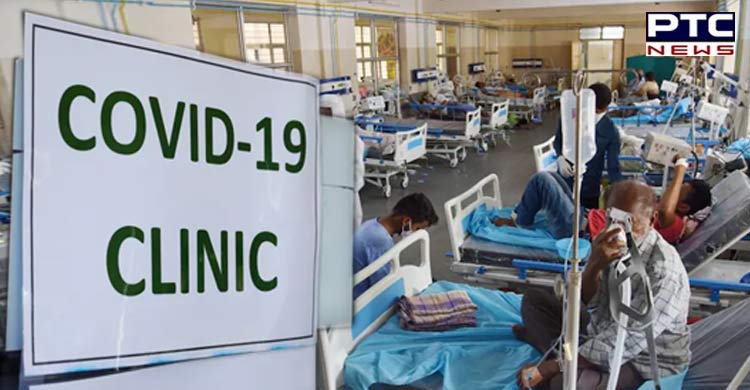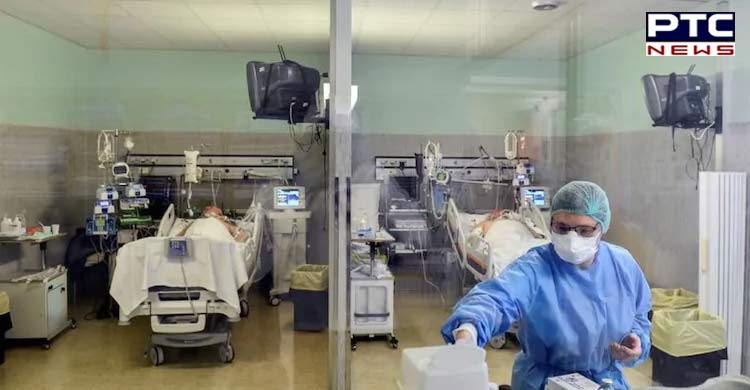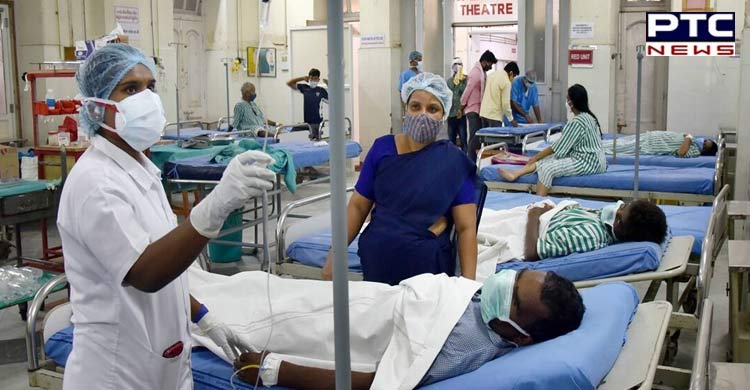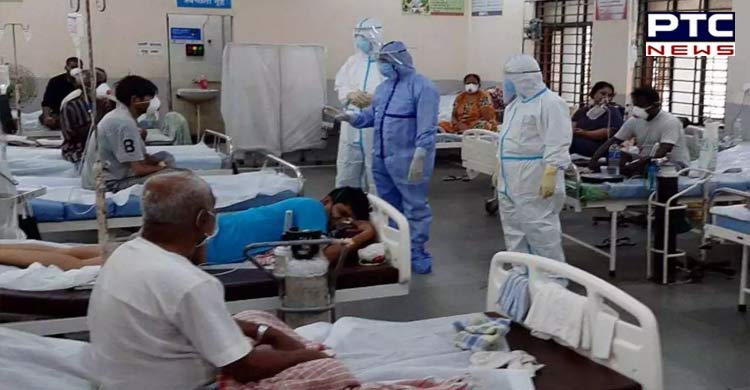
Health Ministry issues revised clinical guidance for Covid patients; read details
New Delhi: Amid the ongoing wave of Covid-19 and rising new variant Omicron cases, the Union Health Ministry has advised patients to go for tuberculosis test and other conditions if cough persists for more than two-three weeks.
 The revised ‘Clinical Guidance for Management of Adult Covid-19 Patients’ issued by AIIMS, ICMR-Covid-19 National Task Force and Joint Monitoring Group (DGHS) under the Union Health Ministry say there is no evidence of injectable steroids benefitting Covid-19 patients not requiring oxygen supplementation or in continuation after discharge.
Also read | Watch video: SAD launches virtual poll campaign from Kharar amid Covid-19 surge
Anti-inflammatory or immunomodulatory therapy, such as steroids, can have the risk of secondary infection such as invasive mucormycosis, when used too early, at higher dose or for longer than required.
[caption id="attachment_571256" align="aligncenter" width="750"]
The revised ‘Clinical Guidance for Management of Adult Covid-19 Patients’ issued by AIIMS, ICMR-Covid-19 National Task Force and Joint Monitoring Group (DGHS) under the Union Health Ministry say there is no evidence of injectable steroids benefitting Covid-19 patients not requiring oxygen supplementation or in continuation after discharge.
Also read | Watch video: SAD launches virtual poll campaign from Kharar amid Covid-19 surge
Anti-inflammatory or immunomodulatory therapy, such as steroids, can have the risk of secondary infection such as invasive mucormycosis, when used too early, at higher dose or for longer than required.
[caption id="attachment_571256" align="aligncenter" width="750"] The revised guidelines also recommend emergency use authorisation or off-label use of Remdesivir in patients with “moderate to severe” disease.[/caption]
The revised guidelines say if cough persists for more than two-three weeks, the patient should opt for investigation for tuberculosis and other conditions. The revised guidelines also recommend emergency use authorisation (EUA) or off-label use of Remdesivir in patients with “moderate to severe” disease and those with no renal or hepatic dysfunction within 10 days of the onset of any symptom. It warned against the use of the drug for patients who are not on oxygen support or in home settings.
The revised guidelines also recommend emergency use authorisation or off-label use of Remdesivir in patients with “moderate to severe” disease.[/caption]
The revised guidelines say if cough persists for more than two-three weeks, the patient should opt for investigation for tuberculosis and other conditions. The revised guidelines also recommend emergency use authorisation (EUA) or off-label use of Remdesivir in patients with “moderate to severe” disease and those with no renal or hepatic dysfunction within 10 days of the onset of any symptom. It warned against the use of the drug for patients who are not on oxygen support or in home settings.
According to the revised guidelines for Covid patients, EUA or off-label use of the Tocilizumab drug may be considered for use in the presence of severe disease, preferably within 24 to 48 hours of the onset of severe disease or ICU admission. Tocilizumab may be considered for patients with significantly raised inflammatory markers, and not improving despite use of steroids with there being no active bacterial, fungal or tubercular infection. [caption id="attachment_571254" align="aligncenter" width="750"]
 Off-label use of the Tocilizumab drug may be considered for use in the presence of severe disease.[/caption]
Coronavirus patients have been classified into those affected by mild, moderate and severe disease, the guidelines stated.
Injection methylprednisolone 0.5 to one mg/kg in two divided doses, or an equivalent dose of dexamethasone, can be given usually for five-10days in moderate cases. The same drug in two divided doses of one to two mg/kg can be given for same duration in severe cases.
According to the guidance note, upper respiratory tract symptoms without shortness of breath or hypoxia has been categorised as mild disease and have been advised home isolation and care. Those suffering from mild Covid should seek medical attention if they have difficulty in breathing, high grade fever, or severe cough lasting for more than five days. Those having breathlessness with SpO2 fluctuating between 90-93 per cent, can get admitted to a ward, and they will be considered moderate cases. Such patients should be given oxygen support.
[caption id="attachment_571252" align="aligncenter" width="750"]
Off-label use of the Tocilizumab drug may be considered for use in the presence of severe disease.[/caption]
Coronavirus patients have been classified into those affected by mild, moderate and severe disease, the guidelines stated.
Injection methylprednisolone 0.5 to one mg/kg in two divided doses, or an equivalent dose of dexamethasone, can be given usually for five-10days in moderate cases. The same drug in two divided doses of one to two mg/kg can be given for same duration in severe cases.
According to the guidance note, upper respiratory tract symptoms without shortness of breath or hypoxia has been categorised as mild disease and have been advised home isolation and care. Those suffering from mild Covid should seek medical attention if they have difficulty in breathing, high grade fever, or severe cough lasting for more than five days. Those having breathlessness with SpO2 fluctuating between 90-93 per cent, can get admitted to a ward, and they will be considered moderate cases. Such patients should be given oxygen support.
[caption id="attachment_571252" align="aligncenter" width="750"] Coronavirus patients have been classified into those affected by mild, moderate and severe disease.[/caption]
Also read | This new viral video will make you recall ‘land kara de’ episode
Respiratory rate over 30 per minute, breathlessness or SpO2 lower than 90 per cent on room air should be considered as severe disease and such patients have to admitted to an ICU as they will need respiratory support.
High flow nasal cannula should be considered in patients with increasing oxygen requirements. Those aged above 60 years, or those having cardiovascular disease, hypertension and coronary artery disease diabetes mellitus and other immunocompromised states, such as HIV, active tuberculosis, chronic lung, kidney or liver disease, cerebrovascular disease or obesity are at high risk for severe disease and mortality, the revised guidelines issued by the Health Ministry stated.
-PTC News
Coronavirus patients have been classified into those affected by mild, moderate and severe disease.[/caption]
Also read | This new viral video will make you recall ‘land kara de’ episode
Respiratory rate over 30 per minute, breathlessness or SpO2 lower than 90 per cent on room air should be considered as severe disease and such patients have to admitted to an ICU as they will need respiratory support.
High flow nasal cannula should be considered in patients with increasing oxygen requirements. Those aged above 60 years, or those having cardiovascular disease, hypertension and coronary artery disease diabetes mellitus and other immunocompromised states, such as HIV, active tuberculosis, chronic lung, kidney or liver disease, cerebrovascular disease or obesity are at high risk for severe disease and mortality, the revised guidelines issued by the Health Ministry stated.
-PTC News
